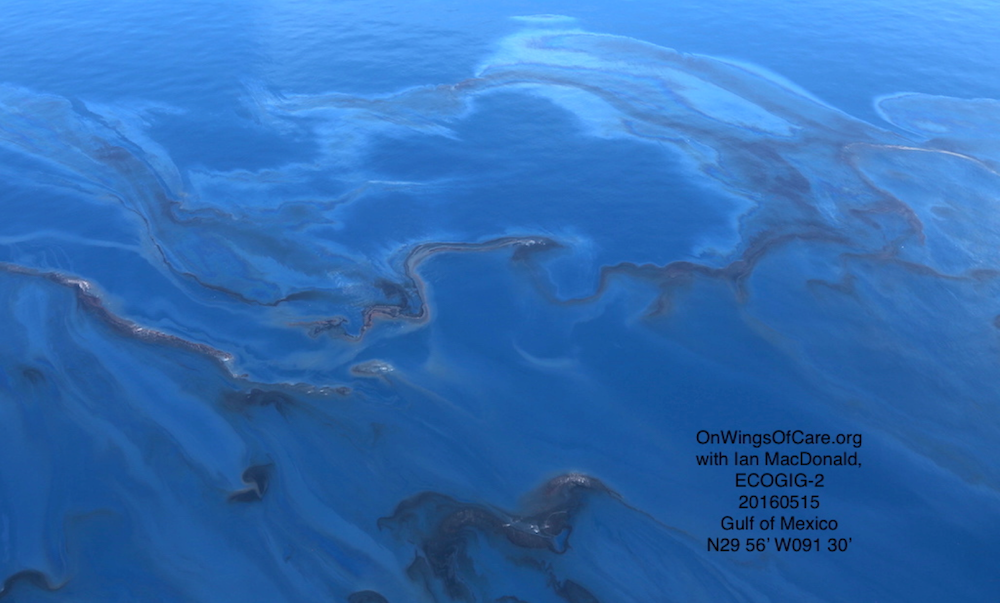Another Gulf oil spill adds fuel to movement against new offshore drilling leases

Photo caption: An aerial view of the oil spilled from a damaged pipeline at a Royal Dutch Shell deepwater production field off the Louisiana coast last week. (Photo courtesy of Ian McDonald and ECOGIG via the On Wings of Care website. To see more photos of the spill, click here.)
Last week a damaged pipeline at a Royal Dutch Shell deepwater production field about 100 miles off the Louisiana coast spilled what's been officially estimated at 90,000 gallons of oil into the Gulf of Mexico before the leak was stopped.
However, On Wings of Care, a nonprofit environmental watchdog group that flew ECOGIG scientist Ian McDonald over the spill, estimated that much more oil was actually released. They noted that the slick covered over 5 square nautical miles, or about 5,000 acres:
Even if the average thickness of the visible oil were a mere 100 micron (0.1 millimeter, vastly smaller than the areas of emulsified oil that stretch across the area), the visible surface oil would represent about 500,000 gallons of oil. We haven't seen images like this since the BP disaster of 2010.
The plane had to stay above 1,000 feet to avoid what was described as a "very uncomfortable smell of oil." Those aboard also spotted a pod of about 50 dolphins swimming near the slick. Watch a video of what they witnessed here:
The spill was first reported Thursday, May 12, after a Shell helicopter reported seeing an oily sheen near four subsea wells. SkyTruth, a West Virginia-based environmental watchdog group, pointed to the accidental nature of the leak's discovery:
That's right: a modern pipeline at a high-tech deepwater development project leaked thousands of gallons of oil, and that leak was accidentally discovered. Not because high-tech telemetry on the pipeline signaled an alarm due to a drop in pressure; not because flow metering detected a difference between what was going in one end of the pipe vs. what was coming out the other. How long would this leak have continued, if not for the sheer luck of having a vigilant pilot happening by?
SkyTruth also raised questions about the slowness and inadequacy of the spill response and cleanup, and blasted the federal government's continuing approvals of drilling permit applications with inadequate spill response plans:
Our government is indulging in a troubling fantasy that is eagerly abetted by the oil industry and pro-drilling politicians, dressing up deepwater offshore drilling as a safe operation so they can continue to rubber-stamp permit applications that contain laughable oil-spill response plans. But as Shell just demonstrated, this emperor has no clothes. When will our government and the global oil industry wake up to this reality and get serious about oil spill response? If the BP/Deepwater Horizon spill wasn't a disaster big and costly enough to provoke a serious overhaul, then what will it take?
This latest spill comes amid a growing movement to halt the issuance of new offshore oil and gas drilling leases. Though the Obama administration recently removed the Atlantic from the list of places where it was considering allowing new oil and gas leasing, the Gulf remains on that list, with up to 10 more lease sales planned over the next five years, as does the Arctic.
From May 3 through May 15, there were more than 20 protest actions involving some 30,000 people on six continents as part of an action called "Break Free From Fossil Fuels." They included actions at the world's largest coal port in Australia, a coal ash disposal site in Turkey and an oil refinery in Washington state.
The very day the Shell leak was discovered, a rally to protest new Gulf oil and gas leases was held at a U.S. Bureau of Ocean Energy Management public hearing on leasing held in New Orleans. The agency is collecting public comments on the proposed leasing plan until June 6 and aims to finalize the plan by year's end.
This past Sunday, more than 1,000 people gathered outside the White House and marched to the Lincoln Memorial Reflecting Pool to protest offshore drilling. Among the speakers was Monique Verdin, a resident of southern Louisiana's St. Bernard Parish and a member of the United Houma Nation.
"When the oil tides rolled in, back in 2010, coastal communities across the Gulf witnessed the devastating gambles taken to harvest fossil fuels off our shores and in our waters. We are on the front lines, witnessing the side effects of extreme extraction, ranging from rising sea levels to tainted waters to more violent and unpredictable weather," Verdin said. "That's why we are calling on President Obama to refuse any new leases in his offshore drilling plan and protect the Alaskan Arctic and Gulf South waters, wildlife and ways of life. It is time we break free from fossil fuels and build the just transition to renewable and sustainable solutions."
Tags
Sue Sturgis
Sue is the former editorial director of Facing South and the Institute for Southern Studies.
